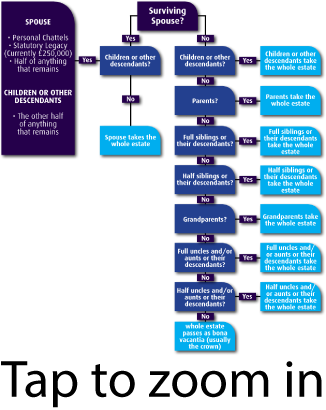The Law of Intestacy
What if I fail to leave a valid will?
- If you do not leave a valid will your estate will pass in accordance with the intestacy rules.
- If you have no relatives the Crown is entitled to take everything.
- Your spouse will not necessarily inherit the whole of your estate.
- A non-married partner may receive nothing.
Rules of Intestacy

If you do not leave a valid will your estate will pass in accordance with the intestacy rules.
The intestacy rules set out who is entitled to inherit from your estate if you do not leave a valid will. If you do not leave a Will your money and possessions will be distributed according to the intestacy rules laid down in the Administration of estates Act 1925. If you have no relatives the Crown is entitled to take everything.
If you are married, or in a civil partnership, the first person entitled to your estate under the intestate rules is your spouse / civil partner, but he or she will not necessarily inherit the whole of your estate (the Civil Partnership Act 2004 came into effect on 5th December 2005 and gave same-sex couples the right to register their partnerships, giving them broadly the same legal rights as married couples).
The amount your spouse / civil partner would inherit depends on how much is in your estate and which of your blood relatives survive you. Assets held in joint names usually pass automatically to the other joint owner(s) and do not form part of your estate (if you are unsure about the type of joint ownership you share with another, you should consider seeking legal advice).
The intestacy rules in a simplified form
If any of the following circumstances apply to you, the intestacy rules may not cater for your situation in the way that you would wish:
- You are living together but are not legally married or in a civil partnership but wish your partner to inherit some or all of your estate.
- You are legally married or in a civil partnership and have children and you wish your spouse / civil partner to inherit all of your estate.
- You have no living relatives and wish to leave your estate to your friends or to a charity.
- You have dependant relatives e.g. Children under the age of 18, elderly relatives or relatives with a disability who have special needs and you want to make sure that they are looked after and provided for. (If you make a Will you can appoint guardians to look after your children and set up trust in your Will to provide for dependants.
- You are legally married or in a civil partnership but have no children.
- You are legally married or in a civil partnership and don’t wish your spouse / civil partner to inherit anything.
- You are legally married or in a civil partnership and have children from a previous relationship and you wish to ensure that your children receive something from your estate.
- Your estate is large and may be liable for Inheritance Tax and you may wish to make arrangements for tax planning.
In a Nutshell.
If you die without a Will and have a surviving spouse or civil partner:
- If you have no surviving children or other relatives, everything goes to your spouse or civil partner.
- If you have no children or grandchildren but your parents survive you, your surviving spouse or civil partner gets the chattels, the first £450,000 of any savings or property and half the remainder. Your parents get the other half. If you have no surviving parents, any surviving brothers or sisters will receive their share unless they are under 18, in which case it will be held in a statutory trust until they reach that age.
- If you have surviving children, your spouse or civil partner gets the chattels (personal belongings, household goods, jewellery, antiques and paintings). They will also receive the equity in the estate – up to a value of £250,000 and a life interest in half the remainder of the estate. This means that the capital is held for your children, who will receive it when your spouse or civil partner dies. Your spouse or civil partner will receive the interest for as long as he or she lives. The other half of your estate will be given to your children immediately, or held for them in a statutory trust until they reach the age of 18.
Statutory Trust.
Under a statutory trust, part of the estate (once the spouse or civil partner has taken his or her fixed share) is held for children or other beneficiaries until the death of the spouse or civil partner. The spouse or civil partner receives the income for the trust for life. (England and Wales Only)
No surviving spouse or civil partner
Your children will share everything. If any of your children have not survived, their own children (i.e. your grandchildren) will inherit their share.
No surviving children or other direct descendants (including great grandchildren)
Your estate will be inherited by your other relatives in the following order:
- Your parents
- Your brothers and sisters of the whole blood, or their children if your siblings have not survived you.
- Your brothers and sisters of the half blood, or their children if there is no surviving parent.
- Your grandparents.
- Your uncles and aunts of the whole blood or their children.
- Your uncles and aunts of the half blood or their children.
- The Crown.




